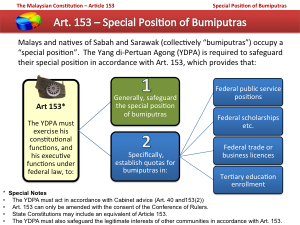Being In the Malays’ Shoes

Unity with equal rights for every citizen in this country is not possible. What we are practicing all this while is unity in diversity based on the social contract which exists in the form of the Federal Constitution.
Dominic Chia
Being in a polarized environment has never been easy to Malaysians. Although known as Bangsa Malaysia, we are well divided by the political environment which is mostly based on race. It is becoming every Malaysians’ uphill task to stay out of stereotypical narratives about other races.
Though it is hard, the best solution for us to tame our stereotypical perception against different races is to be in their shoes. Probably when it comes to individuals, you may say it like: treat others as how you would like to be treated.
That’s why you can see policy makers in the education fraternity propagating their ultimate goal – to implement single-stream schools in this country. However, the implementation of the aforesaid education system is still a far cry, given that our race-based political parties never seem to be come to an agreement over it. Yet, that doesn’t mean that vernacular schools totally forbid their students from being empathetic to other races especially the Malays.
First and foremost, the non-Malays should understand that whatever rights – be it the special privileges of Malays or the position of Islam and Bahasa Melayu as the official religion and official language respectively, originated from the social contract which was formed almost 60 years ago by our forefathers. Eventually it became the Federal Constitution or the supreme law of the country since 31st August 1957.
It all started with the establishment of UMNO led by Tun Hussein Onn to stand against the formation of the Malayan Union by the British, in 1946. Subsequently, UMNO succeeded in foiling the British’s intent to form the Malayan Union. The success had kick-started the joint effort by the Malay Rulers, UMNO and the Non-Malay communities to prepare the nation for independence.
The Non-Malays should always bear in mind that the citizenship given to them is in exchange for the special rights conferred the Malays. In other words: The Malays literally sacrificed their country for the Non-Malays who were brought by the British during the pre-independence era.
So, it is imperative for the Non-Malays to make some effort to understand the so-called special rights of the Malays which is enshrined in the Federal Constitution and to redefine their freedom of voice accordingly.
According to Article 3 of the Federal Constitution, Islam is the Federal Religion of the country. However, Article 3(1) allows other religions or beliefs to be practiced peacefully anywhere in Malaysia.
The position of Islam, consolidated further by Article 11(4), in which the Islamic-Religious Authorities in every state is given the power to control and prohibit the propagating of other religions or beliefs among the Muslims – especially Malays.
Apart from that, Article 8(4)(f) explains that The Malay Regiment of Royal Malaysian Armed Forces (RMAF) is only for the Malays. This Malay regiment formed in 1933, fought the Japanese army and the Communists.
Whereas, Article 89 is about the Malay Reserved Land and Article 152 identifies the Malay language as the national language.
While Malay language has been declared as the national language, other languages can still be learned without any objections. To ensure this, the government built vernacular schools for the Non-Malays.
Besides that, Article 153 explains about the reservation of quota for the Malays and the natives of Sabah and Sarawak in the civil service. And finally, Article 181 of the Federal Constitution defines and assures the powers of the Malay Rulers.
Unity with equal rights for every citizen in this country is not possible. What we are practicing all this while is unity in diversity based on the social contract which exists in the form of the Federal Constitution.
Therefore, the Non-Malay community have to put themselves in the shoes of the Malays to understand better their feelings and sensitivities hovering around the special rights of theirs as in the constitution.
Similarly, the Malay people are also responsible to understand the challenges faced by the Non-Malays to live a decent life, despite being labelled by some as Kaum Pendatang. They also should bear in mind that the Non-Malays are the main reason for the very existence of their special privileges in the constitution.

